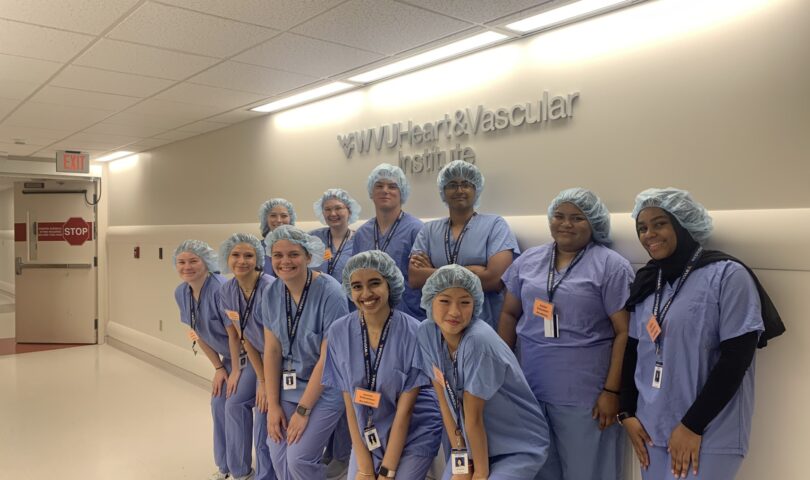In the mid-1900s, bright-eyed teenagers donned red-and-white striped pinafores as they handled paperwork, transported lab samples and assisted patients with daily activities under the supervision of experienced nurses.
Around 60 years later, the legacy of the candy stripers, named for their now-retired uniforms, continues with WVU Medicine’s Junior Volunteer Program.
Open to high schoolers aged 16 to 18, the Junior Volunteer Program offers opportunities for prospective medical professionals to gain real-world experience at WVU Hospitals. Accepted students can begin work as soon as their summer break begins, depending on their school. Volunteers work a minimum of one shift a week in areas of their choice, achieving a minimum of 50 hours before completing the program. While the standard shift lasts 4 hours, volunteers are welcome to work longer if desired.
The Junior Volunteer Program previously operated as the widely known candy stripers program of the 1960s. By the beginning of WVU Medicine volunteer coordinator Nancy Beckner’s employment in 1990, WVU Medicine had moved away from the iconic red and white striped pinafores — reminiscent of striped candies, hence the playful nickname — but continued its mission to engage high schoolers in volunteering and offer hands-on experience in hospital environments. The initiative became known as the Junior Volunteer Program.
Volunteers can work in a variety of positions and departments of their choice, including general and emergency operating rooms, the Betty Puskar Breast Care Center, WVU Medicine Children’s hospital, the NICU, act as a patient ambassador or a wig and prosthetic boutique assistant, visit patients and staff with a certified therapy dog and more. Some roles require additional qualifications.
Through its volunteer programs, WVU Medicine aims to showcase all its hospitals have to offer and encourage students to explore an education and career in the medical field. This program can also act as a way for high school students to gain volunteer experience, serve their community or determine if the medical field is suitable for them.
“Parents are always thanking us for giving their kids this opportunity,” said Beckner. “The kids sometimes have an idea of what they want to do or maybe they don’t have an idea — but after they get here and see things, then they realize, ‘Hey, I want to do that.'”
For students positive of their future in the medical field, the more advanced Health Careers Academy offers similar opportunities as the Junior Volunteer Program on a more dedicated level. For some, the Health Careers Academy is the next step after completing the Junior Volunteer Program. More information about the Health Careers Academy is available at WVUMedicine.org/Volunteers.
If volunteers have proven reliable and fulfilled the 50 hours required for the Junior Volunteer Program, they can continue volunteering through the school year during evenings or weekends. Otherwise, their involvement concludes before the new school year begins.
Interested students can apply online at WVUMedicine.org/Volunteers under the applications tab. Applicants must be a high school student aged 16-18 and should be willing to commit to one shift per week and 50 total hours of service. Those aged 18 must undergo a background check. Accepted students will attend an onboarding session, fulfill immunization requirements and complete learning modules prior to beginning their volunteer work.
Applications for the Junior Volunteer Program are being accepted until April 30.
Inquiries concerning the program can be directed to volunteer coordinators Nancy Beckner or Jennifer Johnson at 304-598-4134 or volunteer@wvumedicine.org.
TWEET @DominionPostWV




